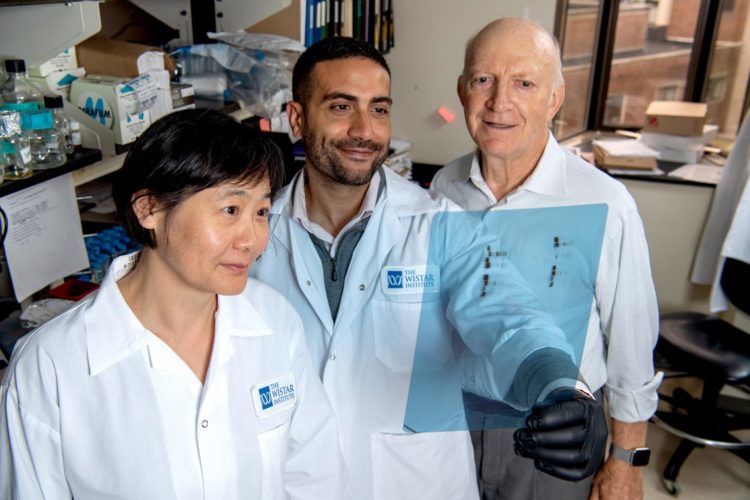
Credit: The Wistar Institute
PHILADELPHIA — (Oct. 17, 2019) — The Wistar Institute and collaborating institutions have received a major grant from the National Institutes of Health to further research on new melanoma targeted therapies integrating the role of the tumor microenvironment in influencing response to therapy and development of resistance.
The grant, totaling $12.5 million over five years, is a collaborative, multidisciplinary research program that supports multiple research projects contributing to the overall objectives.
The collaboration team is led by Meenhard Herlyn, D.V.M., D.Sc., Director of Wistar’s Melanoma Research Center and Professor in the Molecular & Cellular Oncogenesis Program, and Ashani T. Weeraratna, Ph.D., Bloomberg Distinguished Professor of Cancer Biology and the E.V. McCollum Chair of Biochemistry & Molecular Biology at the Johns Hopkins Bloomberg School of Public Health, and co-program leader of the Cancer Invasion and Metastasis Program at the Sidney Kimmel Comprehensive Cancer Center at Johns Hopkins, School of Medicine. Until very recently, Dr. Weeraratna was a member of Wistar’s faculty.
Even though the breakthroughs in immunotherapy and targeted therapy have improved the overall outcome for patients, a significant fraction of them fail to respond or develop resistance to frontline therapy.
“Tumor cells and immune cells communicate and interact with the other cell populations in the environment surrounding the tumor,” said Herlyn. “Therefore, just targeting specific genetic drivers in the tumor cells or specific immune response mechanisms is not effective because the tumor eventually finds ways to bypass the block. Our team brings together diverse expertise so that we can tackle the whole picture from different angles.”
This funding is an extension of a pre-existing grant that has continuously been funded for 10 years and has produced numerous advancements in the field.
“We are excited to deploy our expertise in the tumor microenvironment to hone and improve existing therapies for melanoma,” said Weeraratna. “We also plan to identify novel targets so as to disrupt the age-related changes that drive therapy resistance commonly seen in older melanoma patients.”
During the previous funding cycle, the team revealed the impact of aging on the tumor microenvironment, defined metabolic mechanisms that influence tumor cell survival and immune cell regulation and identified several novel molecular targets and potential inhibitors.
Building on their new understanding of the role of the tumor microenvironment in therapy resistance, researchers are now expanding their studies through four integrated projects that aim to:
- Target the lipid metabolism in immune cell populations that favor tumor growth as a way to inhibit their function;
- Block lysosomal pathways that allow melanoma cells to recycle nutrients and survive in stress conditions;
- Advance development of a molecule that has been proven effective in selectively killing melanoma cells and test it on difficult-to-treat melanoma types;
- Target mechanisms through which melanoma cells circumvent the activity of MEK inhibitors, to overcome resistance and lack of response to therapy.
###
Projects co-leaders on the grant are: Wistar investigators Maureen Murphy, Ph.D., leader of the Molecular & Cellular Oncogenesis Program and the Ira Brind Professor; Dmitry Gabrilovich, M.D., Ph.D., leader of the Immunology, Microenvironment & Metastasis Program and the Christopher M. Davis Professor, Jessie Villanueva, Ph.D., associate professor in the Molecular & Cellular Oncogenesis Program; from University of Pennsylvania: professor Jeffrey D. Winkler, Ph.D., associate professor Ravi K. Amaravadi, M.D., and associate professor Donna L. George, Ph.D.; and from Thomas Jefferson University: professor Andrew Aplin, Ph.D. Cores are led by Herlyn, Weeraratna and Qin Liu, M.D., Ph.D., from Wistar, and Xiaowei Xu, M.D. Ph.D., from University of Pennsylvania. Co-investigators include Zachary Schug, Ph.D., Qing Chen, M.D., Ph.D., and Joseph Salvino, Ph.D., from Wistar.
Grant information: 2P01CA114046-11A1, Targeted Therapies in Melanoma, 2008-2024.
The Wistar Institute is an international leader in biomedical research with special cancer, immunology, infectious disease research, and vaccine development. Founded in 1892 as the first independent nonprofit biomedical research institute in the United States, Wistar has held the prestigious Cancer Center designation from the National Cancer Institute since 1972. The Institute works actively to ensure that research advances move from the laboratory to the clinic as quickly as possible. wistar.org.
Media Contact
Ms. Darien Sutton
[email protected]
215-898-3700
Original Source
https:/





